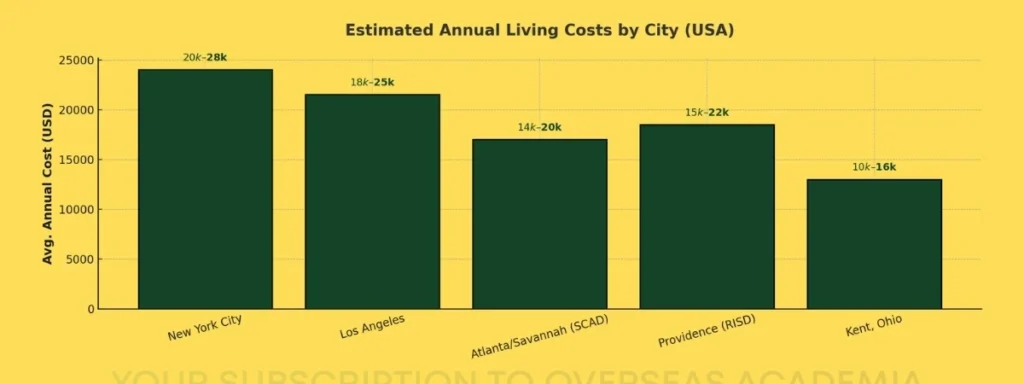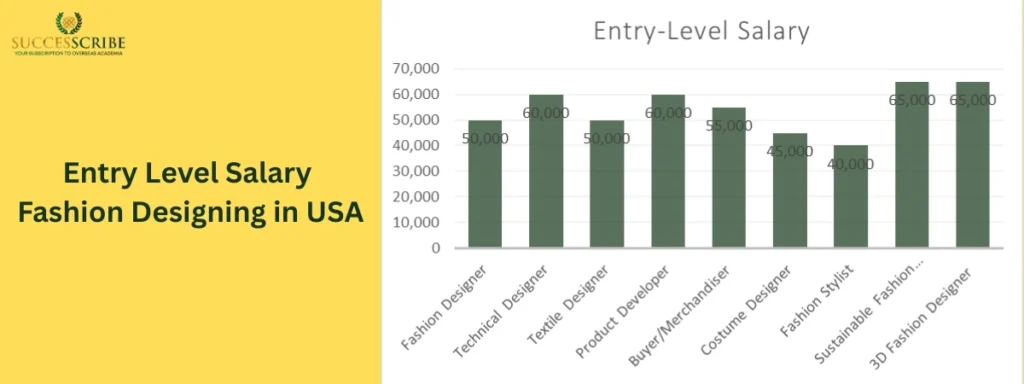The United States stands as a global epicenter of fashion innovation, creativity, and commercial success. From the bustling streets of New York’s Fashion Week to the cutting-edge sustainable fashion movements emerging from California, the USA offers unparalleled opportunities for aspiring fashion designers. Fashion Designing in USA has emerged as a top choice for students who want to build a creative and global career in the ever-evolving fashion industry. This comprehensive topic explores every aspect of pursuing fashion design education and careers in America, providing essential information for both domestic and international students.
Key Highlights – Fashion Designing in USA
- Study at top fashion schools like Parsons, FIT, SCAD & RISD
- Tuition fees range from $18,000 to $60,000 per year
Courses available at bachelor’s, master’s & diploma levels - Choose specializations like apparel design, textile, digital fashion & sustainable fashion
- Learn real skills: sketching, sewing, CAD, garment making & portfolio building
- Salaries after graduation can go from $50,000 up to $100,000+
Education Levels & Program Types in Fashion Design in the USA

Fashion Designing in USA is offered at multiple academic levels, depending on your qualifications and career goals. The most common degrees are at the Bachelor’s and Master’s levels.
1. Bachelor’s Degree in Fashion Design (Undergraduate Programs)
Duration: Usually 4 years (full-time)
Who is it for?
- Students who have completed high school or equivalent (like Class 12 for Indian students)
- Anyone looking to start a professional career in fashion design
Common Degrees:
- Bachelor of Fine Arts (BFA) in Fashion Design
- Bachelor of Arts (BA) in Fashion Design
- Bachelor of Science (BS) in Fashion Merchandising
- Bachelor of Business Administration (BBA) in Fashion Marketing (in some colleges)
What You’ll Study:
- Fashion illustration and sketching
- Pattern making and garment construction
- Sewing techniques and draping
- Fashion history and theory
- Fabric and textile science
- Computer-aided design (CAD) for fashion
- Fashion business, branding, and marketing
Key Features:
- Most programs include portfolio development, internships, and senior fashion shows
- Students get hands-on experience through labs and design studios
- Programs are available in cities like New York, Los Angeles, Atlanta, and Miami—fashion industry hubs
2. Master’s Degree in Fashion Design (Graduate Programs)
Duration: Typically 1 to 2 years (full-time)
Who is it for?
- Students who already have a bachelor’s degree (can be in fashion or another field)
- Professionals wanting to advance their fashion skills, specialize in a niche, or transition into the fashion industry
Common Degrees:
- Master of Fine Arts (MFA) in Fashion Design
- Master of Arts (MA) in Fashion Studies or Fashion Marketing
- Master of Science (MS) in Fashion Technology or Textiles
What You’ll Study:
- Advanced fashion design and creative techniques
- Sustainable fashion and ethical practices
- Fashion trend analysis and forecasting
- Global fashion marketing strategies
- Technology in fashion (e.g., 3D design, digital fashion)
- Thesis or capstone project
Key Features:
- Includes industry collaborations, research, and live projects
- Strong emphasis on building a professional portfolio
- Helps students enter leadership or highly specialized roles in the fashion world
3. Other Program Types
Associate Degrees (2-year programs):
- Offered at community colleges or technical schools
- Suitable for students wanting a faster and affordable entry into the fashion industry
- Can be transferred to a 4-year bachelor’s degree later
Certificate & Diploma Courses:
- Short-term programs (6 months to 1 year)
- Focused on specific skills like fashion illustration, garment construction, styling, etc.
- Often used for upskilling or hobby learning, not equivalent to a degree
Choosing the Right Program
| Goal | Recommended Program |
| Just finished high school and want to start a career in fashion | Bachelor’s in Fashion Design (BFA/BA) |
| Want to specialize after a fashion/design degree | Master’s in Fashion Design (MFA/MA) |
| Want to study fashion business or branding | BBA or MA in Fashion Marketing |
| Looking for a short, skill-focused course | Diploma or Certificate in Fashion |
Suggested Post: Best place to study in USA
Admissions Requirements for Fashion Designing in USA

If you dream of studying fashion design in the USA, it’s important to understand the admissions process in detail. Whether you’re applying for a Bachelor’s or Master’s program, most fashion schools follow a similar process but have specific criteria you must meet.
General Eligibility Criteria
- For Bachelor’s Degree (Undergraduate):
Educational Qualification:
- Completion of high school or equivalent (e.g., Class 12 for Indian students)
- A minimum GPA of around 2.5 to 3.0 on a 4.0 scale is often expected
English Language Proficiency (for international students):
- IELTS: Minimum score of 6.5–7.0
- TOEFL iBT: Minimum score of 79–100 (varies by college)
- Duolingo (accepted by some colleges): Typically 105+
- For Master’s Degree (Postgraduate):
Educational Qualification:
- A completed Bachelor’s degree (ideally in fashion design, art, textiles, or a related field)
- Some schools may accept students from other academic backgrounds if they present a strong portfolio
- Most programs require a minimum GPA of 3.0 on a 4.0 scale
English Language Proficiency:
- IELTS: Minimum score of 6.5–7.0
- TOEFL iBT: Minimum score of 79–100 (varies by college)
- Duolingo (accepted by some colleges): Typically 105+
Portfolio Requirements
A portfolio is the most critical part of your application, especially for design-focused programs. It helps admission officers assess your creativity, skill level, and potential.
What to Include:
- 10–20 pieces of your best work
- Sketches, illustrations, digital renderings
- Fashion design projects: draping, pattern-making, sewing samples
- Mood boards, concept development, creative process
- Photos of garments or prototypes you’ve created
- Optional: Personal fashion blog, lookbooks, or fashion films
Tips for Portfolio Submission:
- Quality matters more than quantity
- Always follow the school’s specific guidelines (dimensions, file format, captions, etc.)
- Include a statement of purpose or artist’s statement describing your inspiration, vision, and design process.
Additional Application Components
Most top fashion universities in the USA require the following along with your application:
- Application Form
- Personal Statement / Essay
- Letters of Recommendation
- Resume or CV
- Transcripts
- Interview (if required)
Standardized Test Scores (SAT / ACT / GRE)
- Bachelor’s Programs:
- Many fashion schools have test-optional policies, meaning SAT or ACT scores are not required, but submitting them may strengthen your application.
- Typical SAT range: 1000–1200, if required
- Master’s Programs:
- GRE is not usually required for MFA or MA programs in fashion, but check specific school requirements just in case
Visa Requirements for International Students
Once accepted, international students must apply for an F-1 Student Visa. To qualify, you must:
- Receive an official I-20 Form from your university
- Show proof of financial ability to pay for your education and living costs
- Provide a valid passport, TOEFL/IELTS scores, and academic records
- Attend a visa interview at your nearest U.S. embassy/consulate
Suggested Post: Best states in USA for international students
Top Universities for Fashion Design in the USA
The USA is home to some of the world’s best fashion schools, offering world-class design education, industry connections, and alumni who’ve made their mark globally. Some of the best institutions offering Fashion Designing in USA include Parsons School of Design, FIT, and SCAD, known for their industry-driven curricula and global rankings. Here’s a curated list of the top fashion design universities in the USA, along with their key features:
| School | Program Offered | Tuition / Annual | Unique Strengths |
| FIT (NYC) | Fashion Design, Business, Textiles | $19.6 k in-state; ~$27 k OOS | Over 48 programs; industry faculty; NYFW access |
| Parsons (NYC) | Fashion Design; BFA/MFA options | $60 k | Holistic, tech-driven curriculum; elite alumni (Ford, Jacobs) |
| Pratt Institute (Brooklyn) | Fashion Design | $51 k | Cultural storytelling; NYC connections |
| RISD (Providence) | Apparel Design, Textiles | $60 k | Renowned for craftsmanship; celebrated alumni | Cultural storytelling; NYC connections |
| SCAD (GA) | Fashion Design, Marketing, Fibers | Varies; scholarships available | Large fashion shows; industry exposure |
| Otis (LA) | Fashion Design | $49 k net price | West Coast focus; sustainability, costume design |
| Kent State (OH) | Fashion Design & Merchandising | $20–30 k | Global programs; NYC campus |
Other notable schools: Academy of Art University, Drexel, Marist, LIM College, Columbia College Chicago.
Suggested Post: Duolingo accepting universities in USA
Apply to Top European Universities
Make your application simple and stress-free with Successcribe
Get Expert Help NowFees & Cost of Attendance for Fashion Designing in the USA

Studying fashion design in the USA can be a valuable investment in your future, but it’s important to understand the costs involved. These expenses include tuition fees, living expenses, materials/supplies, and other day-to-day costs. While pursuing Fashion Designing in USA, international students should be prepared for tuition fees ranging from $18,000 to $60,000 per year depending on the institution.
1. Tuition Fees by Program Type
The cost of tuition largely depends on the type of university (public or private) and the level of the program (bachelor’s or master’s).
Bachelor’s Degree (BFA, BA, BS)
- Public Universities (e.g., FIT, Kent State):
In-State: $8,000–$15,000 per year
Out-of-State/International: $18,000–$30,000 per year
- Private Universities (e.g., Parsons, Pratt, RISD, SCAD): $40,000–$60,000 per year. Most bachelor’s degrees in fashion take 4 years to complete.
Master’s Degree (MFA, MA, MS)
- Tuition ranges from $25,000–$50,000 per year, depending on the institution and program length.
- Master’s programs usually last 1.5 to 2 years
2. Living Expenses
Living costs depend heavily on the city you’re living in. Major fashion hubs like New York City and Los Angeles are more expensive compared to smaller towns or cities.
| City | Average Living Costs/Year |
| New York City | $20,000–$28,000 |
| Los Angeles | $18,000–$25,000 |
| Atlanta/Savannah (SCAD) | $14,000–$20,000 |
| Providence (RISD) | $15,000–$22,000 |
| Kent, Ohio | $10,000–$16,000 |
Living expenses include:
- Housing (shared or single apartment, or on-campus dorms)
- Food and groceries
- Transportation (metro, bus, ride-share)
- Utilities (electricity, internet, water)
- Personal expenses
Suggested Post: Engineering management courses in USA
Core Curriculum: What Fashion Students Learn
Fashion design programs in the USA are comprehensive and practice-based. A core strength of Fashion Designing in USA is the ability to customize your academic path through specializations like sustainable fashion, accessory design, and digital fashion. The coursework begins with fundamentals and gradually moves toward advanced design and portfolio development. While course titles may vary by institution, the core subjects generally include:
| Subject Area | What You’ll Study |
| Fashion Illustration & Design Concepts | Sketching garments, figure drawing, visual design thinking |
| Pattern Making & Draping | Manual and digital methods for pattern development and garment shaping |
| Sewing Techniques & Garment Construction | Machine and hand-stitching, seams, closures, and finishing methods |
| Textile & Fabric Studies | Fiber science, fabric identification, manipulation, and sustainability |
| Computer-Aided Design (CAD) | Software like Adobe Illustrator, CLO 3D, Gerber AccuMark for digital fashion |
| Fashion History & Cultural Studies | Global evolution of fashion, trends, and influences from different eras |
| Fashion Marketing & Retail Strategies | Consumer behavior, merchandising, branding, and digital selling |
| Portfolio & Collection Development | Creating a professional body of work showcasing design process and execution |
| Sustainability & Ethical Fashion | Responsible sourcing, circular design, slow fashion, and climate impact |
| Fashion Business & Entrepreneurship | Launching a fashion line, brand management, costing, and production planning |
Most universities follow a credit-based structure, and students build skills through studio work, critiques, live projects, and internships.
Emerging Trends in Curriculum
Fashion design programs in 2025 have increasingly adopted technology and sustainability as core elements. Current curriculum trends include:
- Digital Fashion & 3D Design: Use of CLO 3D, Marvelous Designer, and Blender to create virtual garments
- AI in Fashion: Courses exploring artificial intelligence in fashion prediction, retail, and design automation
- Smart Textiles & Wearable Tech: Integration of sensors, light-reactive materials, and AR-enhanced clothing
- Sustainable Supply Chain Management: Lifecycle analysis, low-waste production, and circular economy models
- Fashion UX/UI: Courses that link digital fashion experiences with user interface design in e-commerce.
Suggested Post: Cyber security courses in USA
Career Paths & Job Opportunities After Fashion Designing in the USA
A degree in fashion design from the USA doesn’t just prepare you to create clothing; it opens the door to a diverse and dynamic industry with global opportunities. From haute couture to tech-integrated wearables, the U.S. fashion industry supports creativity, business, and innovation.
Average Salary Range by Role – Fashion Designing in USA

Whether you graduate with a bachelor’s or master’s degree, you can pursue roles in various segments of the fashion world:
| Job Title | Entry-Level Salary | Experienced Salary |
| Fashion Designer | $50,000 | $90,000+ |
| Technical Designer | $60,000 | $85,000 |
| Textile Designer | $50,000 | $75,000 |
| Product Developer | $60,000 | $85,000 |
| Buyer/Merchandiser | $55,000 | $100,000 |
| Costume Designer | $45,000 | $80,000 |
| Fashion Stylist | $40,000 | $70,000 |
| Sustainable Fashion Consultant | $65,000 | $95,000 |
| 3D Fashion Designer | $65,000 | $100,000+ |
Best Cities in the USA for Fashion Careers
| City | Why It’s Important |
| New York City | Global fashion capital; home to major brands, design houses, and media |
| Los Angeles | Strong presence of entertainment fashion, streetwear, and sustainable brands |
| San Francisco | Emerging digital fashion and tech hubs (especially in e-commerce) |
| Miami | Popular for resort wear, luxury retail, and Latin American fashion markets |
| Chicago & Atlanta | Growing markets for merchandising, retail, and fashion events |
Conclusion
Fashion isn’t just a career – it’s a calling. And studying fashion designing in USA places you at the heart of global innovation, creativity, and change. Here, your sketches become statements, your fabrics become voices, and your vision finds a stage.
If you dream in color, think in silhouettes, and believe fashion can shape the future, then this is your moment. The runway is ready. Step into your spotlight.
FAQs
What are the eligibility requirements to study fashion designing in the USA?
To pursue a Bachelor’s degree, you need a high school diploma or equivalent, a strong portfolio, and proof of English proficiency (e.g., IELTS/TOEFL).
For a Master’s degree, a bachelor’s in design or a related field is required, along with a portfolio, resume, SOP, and English language test scores.
Which are the top universities for fashion designing in the USA?
Some of the most renowned institutions include:
1. Parsons School of Design (New York)
2. Fashion Institute of Technology (FIT)
3. Savannah College of Art and Design (SCAD)
5. Rhode Island School of Design (RISD)
5. Pratt Institute
6. Kent State University
How much does it cost to study fashion designing in the USA?
Tuition fees range from:
1. $18,000 – $30,000/year for public universities (international students)
2. $40,000 – $60,000/year for private universities
Additional costs include living expenses ($15,000–$25,000/year), materials, insurance, and travel.
Is fashion designing a STEM-designated program in the USA?
Most traditional fashion design programs are not STEM-designated. However, specializations like Fashion Technology, Product Development, or 3D Fashion Design may fall under STEM, making students eligible for a 24-month OPT extension. Check with individual universities for clarification.
Can I start my own fashion brand after graduation?
Yes. Many U.S. graduates launch their own fashion labels or e-commerce brands after completing their degree. Universities often provide entrepreneurship resources, mentorship, and business incubators to support student startups.
Related Post
Bachelors degree in USA
Animation Courses in USA
Digital marketing courses in USA
Duolingo accepting universities in USA















